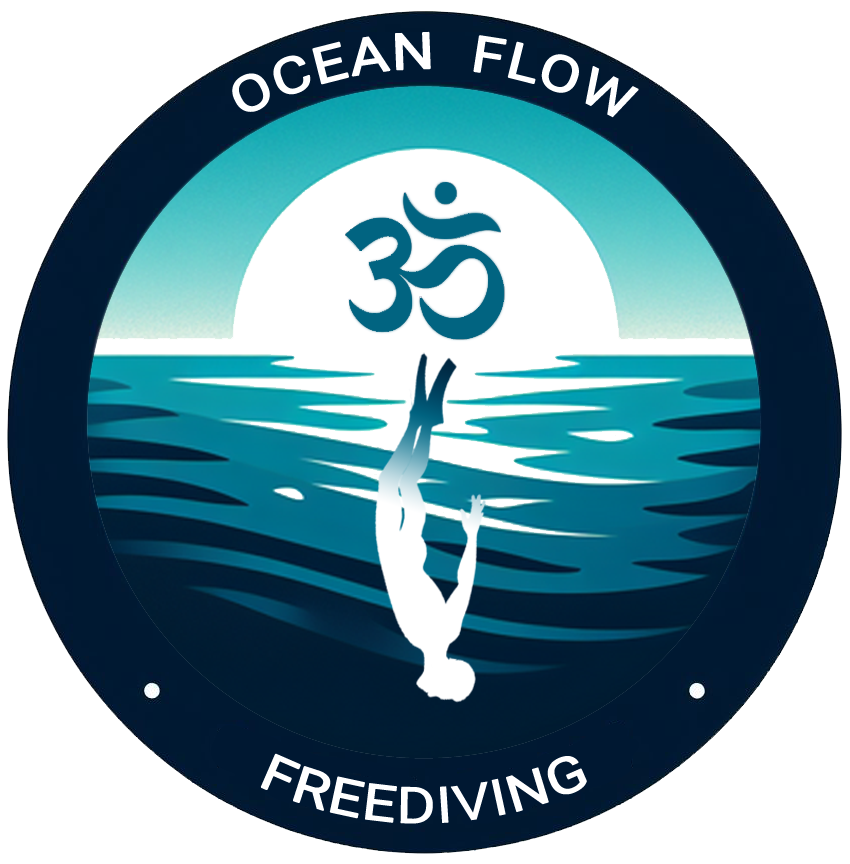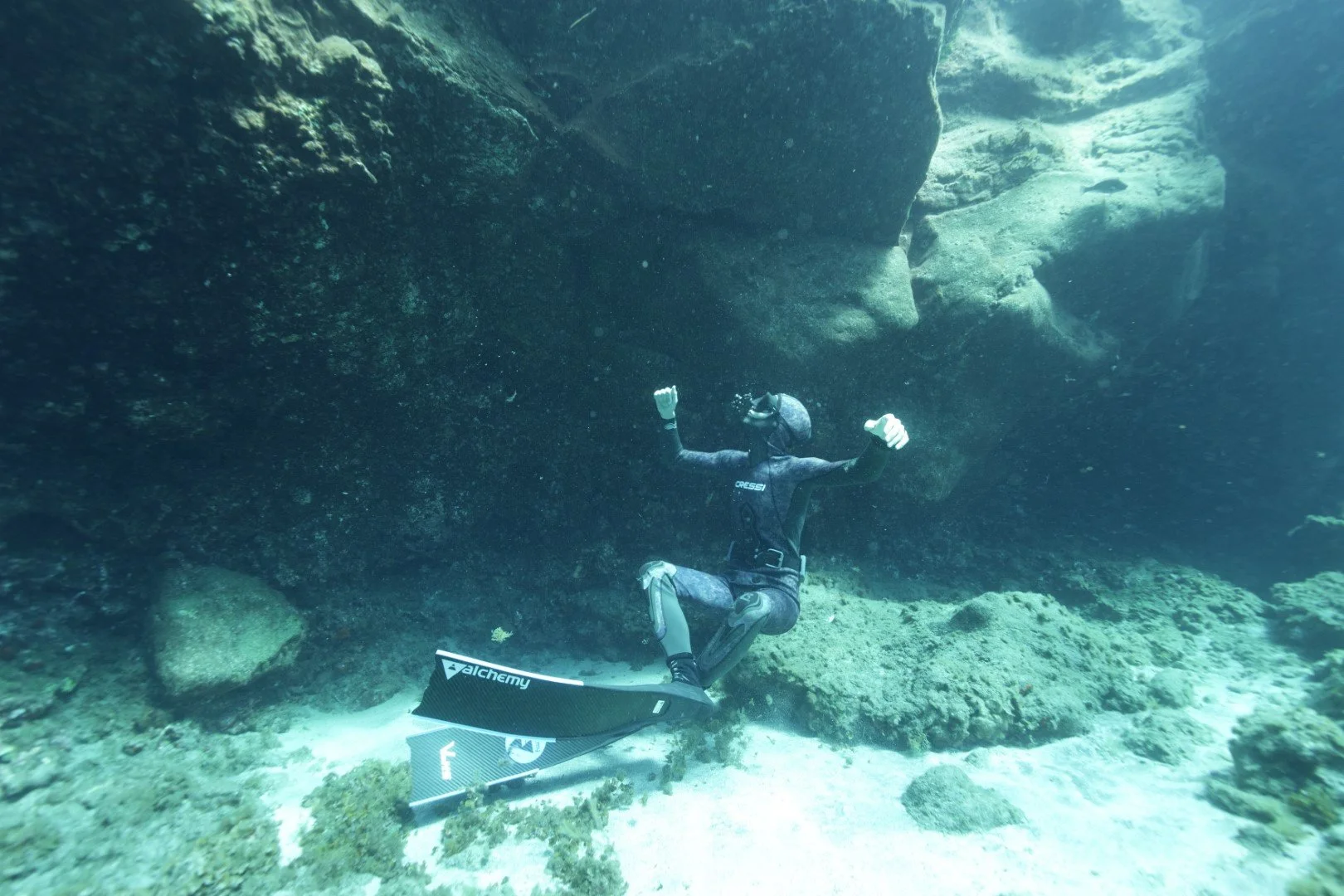Mind Control and Apnea 3/3
Body-Mind response to Apnea
Body reaction to freediving
The reaction of the body to deep dives, and breath hold is well documented and referred to as the Mammalian dive reflex (Bradycardia, Peripheral Vasoconstriction, Splenic Contraction, Reduced Metabolic Rate, Enhanced Oxygen Extraction). Other effects are directly linked to the pressure increase such as, discomfort on the chest and diaphragm, in the airways (sinuses, trachea, eustachian tubes, internal ears).
These combined effects produce powerful physical sensation that often lead to interrupting the dive at a certain depth, or the breath hold at a certain time.
Here the practice of meditation helps us tremendously. By observing the sensation, acknowledging them, accepting them without reacting to them, we learn how to differentiate discomfort from pain, and to allow the build up of sensations. Yogis often summarize it with “find comfort in discomfort”.
By allowing sensation and disidentifying from them we don’t enter into the retroactive loop and we break free of our chains!
We are now able to prolong our dives until our physiological limits in a safe way.
Mind reaction to freediving
In every discipline, from the moment we put our head under water, our thoughts recede.
However the monkey mind is always there,and as a protective mechanism, will try to convince us by any means that we should abort our dives. Sometimes our mind (Ahamkara-ego) will even try to convince us to continue a dive, even when we’re clearly out of the safety zone.This can be in the form of a thought (Why am I doing this, I can do that…), a physical sensation (itching, burning, fake contraction, euphoria etc..) or an emotion (anxiety, fear, anguish, overconfidence). As freedivers, we are constantly trying to overcome these stimuli, what we call “the mind game”.
As we progress in our ability to observe the mind without engaging in the stimuli (with the practice of meditation), we are able to relax and observe them without labeling them as good or bad. We accept without judgment, and by doing so enter an alternated state of pure awareness.
A sharp mind, calm and aware, allows us to observe “negative” patterns, and also protect us from all our egotic tendencies.
We, freedivers, often experience something similar that we relate as “Blue mind” or “Bubble” or “Empty mind”. From this state of mind, many describe an indescribable arising feeling of bliss, gratefulness or union which in turn can be called Yoga.
Body-mind practices :
All the practices described in the five pillars of Yoga, will help every aspect of our diving and breath hold.
As we learn of the intricacies of the body and mind, here are a few examples of body-mind practices that can help us during our dives.
On dry land, lay in Savasana, and repeat your dive mentally. Start from the relaxation phase, imagine each phase of a perfect dive. This will build confidence and allow the mind to relax during the real dive.
Inverted asanas, helps us relax our body and mind in a head-down position, and trim our body in preparation for the free fall.
During relaxation phases, invoke gratitude “How lucky am I to be here, my safety is here, my friends are here, thank you” and smile. You can also invoke protection “ I am protected, I am carried by the water”. Being happy makes us smile, but smiling also makes us happy, use and abuse of this retroactive loop!
During relaxation, mentally scan the feeling in your body, and command each body part to relax totally. Start from the tip of the toes to the top of the head. This will instantly deeply relax your body and mind.
After the urge to breathe arises, mentally repeat “I am fine, I am full of Oxygen” with an inner smile.
During the breath hold you can repeat “ I am happy, in peace, in harmony” and feel these feelings. Use the power of the smile to induce additional relaxation.
You can also repeat the Universal Mantra “Om” and feel the warm enveloping sensation.
Conclusion
As a body-mind discipline we have seen the utter importance of the mind in all the fields of Apnea. The retroactive loop between the body and the mind can be used. A disciplined mind will not interfere with our dives by triggering negative body reactions. We can also develop positive body reactions, and allow us to dive in safer, deeper, longer and above all in a much more enjoyable way.
Turning inward and disciplining the mind is a task that requires discipline and commitment, but many practices have been developed throughout history. Yoga, Silent Meditation, Active Meditation, Prayer, Self Hypnosis, Visualisation are powerful tools to harness the power of our minds.
The benefits extend to all aspects of our lives and naturally produce increased freediving performances. It enables us to instantly turn into an alternative state of consciousness, which, in turn, triggers bodily reactions that intensify relaxation and prolong the breath hold. It also enhances the ability to sustain any body-mind stimuli, such as stress, fear, panic, pressure, and discomfort.
Without the proper training, the mind can become a tyrannic master. But with the proper discipline it can turn into a powerful ally that allows us to adjust our inner chemistry, and tune our bodies for the ultimate diving experience.

